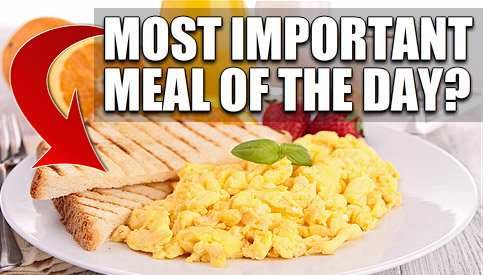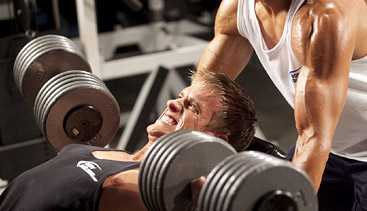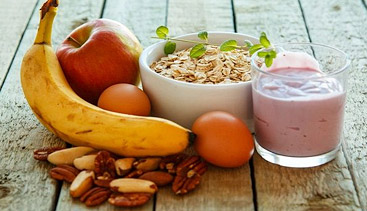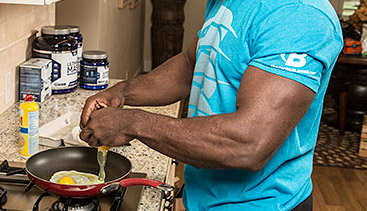IS BREAKFAST IMPORTANT FOR BUILDING MUSCLE & LOSING FAT?

Breakfast…
The nutritional cornerstone of a healthy fitness diet – or simply an optional morning meal?
For years conventional wisdom has told us that breakfast is the “most important meal of the day”.
It’s claimed to boost metabolism, kick start the muscle growth process, and provide you with the steady energy needed to tackle the day ahead.
But how much truth is there to this really?
Let’s take a closer look to see if that morning serving of scrambled eggs and oatmeal really lives up to the hype, or if the importance of breakfast is nothing more than an outdated myth.
We’ll examine the question from three different angles: fat loss, muscle building and overall health.
Is Breakfast Important For Fat Loss?

Does breakfast boost metabolism and burn fat?
While the process of fat loss is certainly highly complex at the biological level, it ultimately comes down to one central factor: you must consistently burn more calories than you consume.
This is known as creating a “calorie deficit”, and it’s the underlying foundation upon which your entire fat loss program must be built.
For breakfast to improve your fat burning results, it would need to produce a more favorable net calorie balance in some way.
Unfortunately for those in the “breakfast burns fat” camp, the research simply doesn’t support this claim.
While it’s true that breakfast does increase your metabolic rate, this is true of any meal you consume since digesting and absorbing food requires energy.
Meal frequency and meal timing have been an issue of debate in fitness circles for many years, and the research has now come to a fairly confident conclusion:
As long as total calories for the day remain the same, the specific way in which those calories are spaced out will have no significant impact on overall fat loss. (1, 2, 3, 4, 5)
Whether you eat 2 large meals, 4 medium sized meals or 6 small meals – and whether you consume a higher percentage of those calories earlier or later on in the day – both basal metabolic rate and the thermic effect of food (how many calories are burned during digestion) are not significantly altered.
A wide variety of different meal timing protocols can be used successfully for fat loss, ranging from intermittent fasting (where no food is consumed for the first 8 hours of the day, usually followed by 2 larger meals) to more frequent feedings where a small meal is consumed every 2-3 hours.
Breakfast does not “kick start your metabolism” in any special way, and pushing your first meal until later in the day does not lower your resting metabolic rate or lead to excess fat gain. (6, 7)
What about the issue of appetite control?
It’s often said that skipping breakfast will increase hunger and cause you to overeat later on.
Although there will always be individual differences from person to person, research has also found this claim to be generally false.
While it’s true that skipping breakfast increases food intake in the later hours, the total calories for the day as a whole still end up around the same level or even lower. (8, 9, 11)
One study even found that requiring non-breakfast-eaters to eat breakfast results in weight gain. (12)
Bottom line on breakfast and fat loss?
Given equal calorie intake for the day, it makes no difference from a fat loss perspective whether you eat immediately after waking up or push your first meal until later on. In some people, skipping breakfast actually has a positive effect on appetite and results in fewer total calories being eaten.
Is Breakfast Important For Muscle Building?

Does breakfast build muscle?
We’ve all heard the claim that you must eat every three hours during the day or you’ll go “catabolic” and begin losing muscle mass.
Fortunately, this is yet another piece of conventional wisdom that doesn’t hold up to scientific scrutiny.
It is true that going too long without a meal will cause your body to break down muscle tissue for energy, but it requires much more than 3 hours in order for this to occur to any significant degree.
While the mechanisms behind muscle growth and muscle loss are quite complex, it ultimately boils down to the overall ratio of protein synthesis (muscle growth) to protein breakdown (muscle loss). (13)
This is known as your “protein turnover rate”.
If the total amount of protein synthesis exceeds the total protein breakdown rate, you’ll gain muscle. If protein breakdown exceeds protein synthesis, you’ll lose muscle.
However, short-term fasting does not appear to negatively impact protein turnover rate. (14)
This is why intermittent fasting protocols can still be effective for bodybuilders who are looking to build muscle and gain strength. (15)
As long as you’re able to get in at least 2, and preferably 3 separate protein feedings for the day as a whole, you’ll still be able to gain muscle effectively by skipping breakfast if the total calories and macronutrients are the same over a 24 hour period.
That said, there are two caveats here to consider…
The first is that if your goal is to fully maximize muscle growth to your utmost potential, fasting for a significant portion of the day is probably not ideal.
The difference may not be overly significant, but for optimal muscle building results, it’s probably best to get some protein in at least within a few hours of waking rather than spending the entire first half of the day in a fasted state, such as with intermittent fasting.
The second issue is related to strength and energy levels, since working out fasted has been shown to negatively impact peak performance.
In other words, if you’re performing a maximum effort weight training or cardio session and want to put up the best numbers possible, going at it on a completely empty stomach is likely not your best choice.
For those who do want to continue training fasted in the morning regardless, consuming around 20 grams of protein within a couple hours of completing your session is recommended to ward off any potential muscle loss.
Just how significant the difference will be if these two caveats are ignored is not known and will vary from person to person, but they should be considered if you want to be fully on the safe side in terms of optimizing muscle growth and performance.
Bottom line on breakfast and muscle building?
As long as you can get in 2 (and ideally 3) separate protein feedings for the day as a whole (along with the proper total calories/macros), you can still build muscle at or near your full potential while skipping breakfast. That said, for 100% optimal results, consuming some protein at least within a few hours of waking is probably ideal, as is avoiding training intensely on a completely empty stomach.
Is Breakfast Important For Overall Health?

Observational studies have found that breakfast eaters are generally healthier than non-breakfast eaters. (16, 17, 18)
Unfortunately, this has led to the misconception that eating breakfast therefore must be healthier.
However, observational studies only demonstrate correlation rather than direct causation.
In other words, these people aren’t healthier because they eat breakfast – rather, the type of person who would be more inclined to eat breakfast would also be someone who follows a healthier diet and lifestyle in general. (19, 20, 21)
Breakfast eaters are also more likely to come from a higher socioeconomic profile than those who don’t and will be more likely to follow “traditional” health advice such as exercising, eating fruits/vegetables, and not skipping breakast.
They’re healthier in spite of the fact that they eat breakfast, but not because of it.
In fact, some evidence even suggests that skipping breakfast and pushing your first meal until later in the day (such as with intermittent fasting) can have certain health benefits.
Short-term fasting can reduce inflammation markers (including NRLP3, inflammasome activation, and oxidative stress), improve cardiovascular health, decrease blood pressure and lower cholesterol. (22, 23, 24)
This is why some researchers believe that populations who fast frequently have better overall health and live longer. (25, 26)
The jury is still out on just how significant these effects are, but the central point is that there’s no real reason to assume that breakfast is “healthy” in any specific way, or that skipping breakfast will have a negative impact on health markers.
In fact, the very statement that “breakfast is the most important meal of the day” was actually created by Caleb Jackson and John Harvey Kellogg in order to promote their newly invented breakfast cereals.
The supposed health benefits of breakfast are primarily based on advertising – not on real nutritional science.
Bottom Line On Breakfast And Overall Health?
There’s no convincing reason to assume that eating breakfast has any significant health benefits, and some studies have actually found certain upsides to short-term fasting in the earlier portion of the day.
Should You Eat Breakfast Or Not? Practical Recommendations

When it all comes down to it, the decision to eat breakfast or not is mostly a matter of personal preference.
You can make the decision for yourself based on your individual appetite, energy levels, daily schedule, fitness goals and on what is most convenient for you.
Breakfast does not provide any unique fat burning, muscle building or overall health benefits, and the vast majority of your results will simply be determined by your total calorie and macronutrient intake for the day as a whole.
The only caveat to consider is for those whose goal is to fully maximize muscle growth and performance, in which case fasting for a prolonged period of the day is likely not ideal, nor is training in the morning on a completely empty stomach. (Even then, the difference may still be negligible overall)
If you’re unsure on the issue of eating breakfast versus skipping breakfast, go ahead and experiment to see how your body responds by either consuming a regular morning meal right after waking or by waiting a few hours or more to eat.
Some people find that delaying their first meal until the afternoon is beneficial for controlling appetite, making it easier to stick to their fat loss diet and maintain a calorie deficit over time.
Others, like myself, prefer to eat a regular breakfast right after waking.
Ultimately, you just have to test it out for yourself and see.
Just keep in mind that if you’re accustomed to eating a regular breakfast, your appetite may take several weeks to adjust to a non-breakfast diet plan.
If you found this article helpful, make sure to sign up for your FREE custom fitness plan below...




